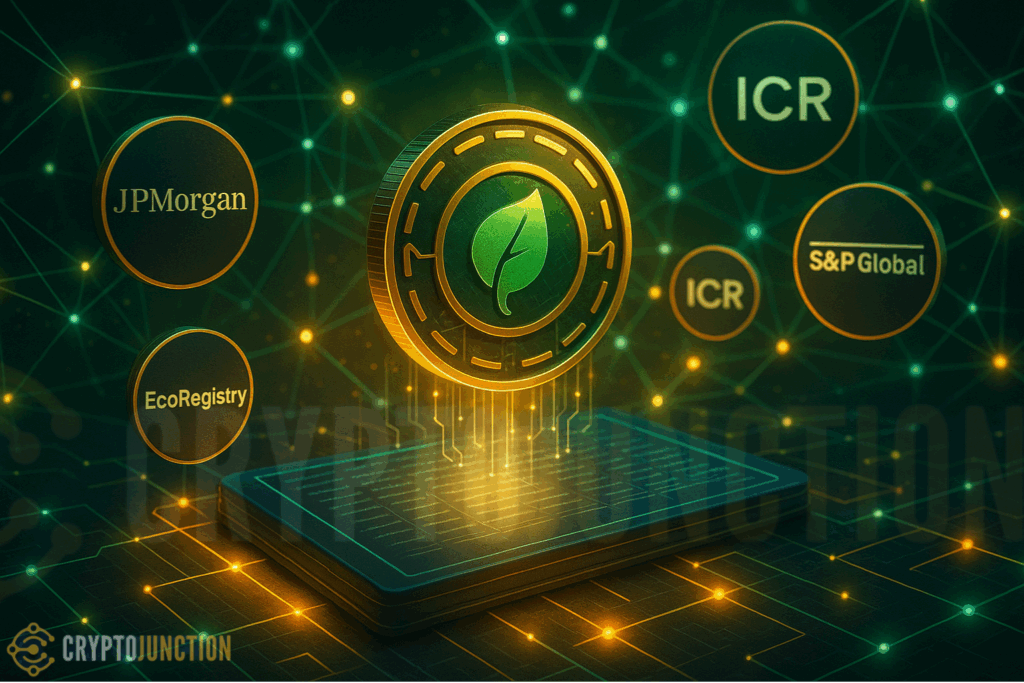JPMorgan Chase, through its blockchain unit Kinexys, has kicked off a pilot project to tokenize carbon credits. This marks a significant step in carbon credit tokenization. Announced on July 2, 2025, the initiative partners with EcoRegistry, the International Carbon Registry (ICR), and S&P Global Commodity Insights. Their goal is to tackle transparency and efficiency challenges plaguing the voluntary carbon market.
In contrast to past projects, this pilot goes in at the registry level. It aims to put in place credit issuance, tracking, and retirement via distributed ledger technology. The testing phase is currently being done in registry systems that EcoRegistry and ICR are running. It involves carbon credit tokenization. Also, S&P Global will put to the test very soon the Environmental Registry platform of theirs.
Alastair Northway, who is the Head of Natural Resource Advisory at J.P. Morgan Payments, reports that the voluntary carbon market is at a stage which is very much in favor of innovation. He also put forth that it is currently in the early stages of development. This is crucial for the implementation of tokenization to create a wide-reaching and trustworthy ecosystem.
Tackles Market Inefficiencies
The carbon credit market is seeing great growth to the tune of $16.38 trillion by 2034. However, it also has very large-scale issues. Over 30 registries do not integrate well with each other. This causes confusion, inefficiencies, and low buyer trust. Additionally, issues of greenwashing, double counting, and unverified credits have caused large corporate buyers to stay away. This is due to the complexities associated with carbon credit tokenization.
JPMorgan has put forth a blockchain solution which tracks each credit as it goes from issue to retirement. Each token represents one verified ton of CO₂ offset. They usually come from renewable energy or nature based climate projects.
This pilot, which also reports registry data in real time, is put in to improve buyers’ assessment of credit quality. Blockchain’s transparency may restore the credibility and liquidity that has gone out of the market. Especially with carbon credit tokenization efforts. Also, this is a chance for large-scale corporate participation.
Carbon Credit Tokenization Gains Global Momentum
JPMorgan has joined in a larger trend of real-world asset tokenization. The bank’s Kinexys platform has put out tokenized U.S. Treasury bonds which is also developing JPMD, a deposit token which will be made available on Coinbase’s Base platform. Also in this report the bank’s foray into environmental finance reflects its interest in carbon credit tokenization.
The World Bank’s CAD Trust and Northern Trust’s Carbon Ecosystem are developing blockchain-based platforms for carbon credit issue and verification. As a whole, these initiatives are setting the stage for a next-generation global carbon market.
Support in the US, which includes the passage of the GENIUS Act and a more crypto-friendly environment during the Trump administration, is also adding to the success of this initiative. Should it prove to be a success, JPMorgan’s pilot project focusing on carbon credit tokenization could assist companies in achieving climate targets. These were put forth by the Paris Agreement’s Article 6. At the same time, it could provide the carbon market with the much-needed credibility it has been lacking.

